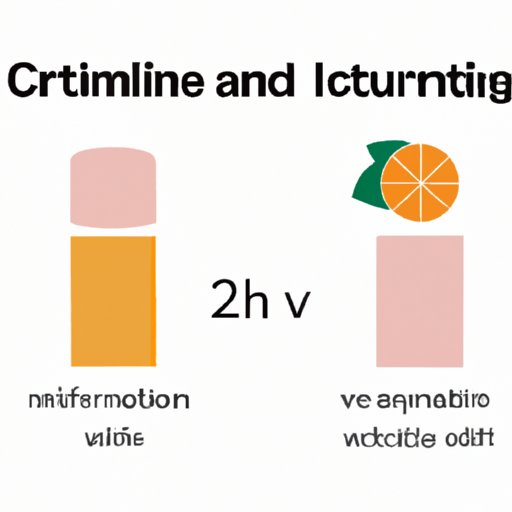
I. Introduction
Retinol and vitamin C have become popular ingredients in skincare lately as people look for ways to achieve smoother, brighter, and clearer skin. But with so many conflicting opinions on how to use these ingredients, it’s hard to know whether or not they can be used together effectively. In this article, we’ll explore the benefits of retinol and vitamin C, how they work together to improve your skin, and tips for properly using them in tandem. We’ll also debunk common myths, address potential side effects, offer product recommendations, and provide expert advice on how to incorporate retinol and vitamin C into your routine.
II. Understanding the Benefits of Using Retinol and Vitamin C in Your Skincare Routine
Before we dive into how to use these two ingredients together, let’s first establish their individual benefits and how they can improve your skin.
What is Retinol?
Retinol is a derivative of vitamin A and is commonly used in skincare products due to its anti-aging properties. It has been proven to stimulate collagen production, which in turn improves the texture and firmness of skin. Retinol can also speed up the cell turnover process, resulting in smoother, clearer skin and minimizing the appearance of fine lines and wrinkles.
What is Vitamin C?
Vitamin C is a powerful antioxidant that can neutralize free radicals, preventing damage to skin cells caused by the environment and aging. It can also help brighten skin by inhibiting the production of melanin, the pigment responsible for dark spots and hyperpigmentation.
Benefits of Retinol
Retinol is considered the gold standard for anti-aging because it can:
- Stimulate collagen production, improving skin texture and firmness;
- Increase cell turnover, minimizing the appearance of fine lines and wrinkles;
- Accelerate healing of damaged skin;
- Reduce the appearance of pores;
- Help fade acne scars and sun damage.
Benefits of Vitamin C
Vitamin C can provide numerous benefits for the skin such as:
- Neutralizing free radicals and protecting the skin from environmental damage;
- Brightening skin by reducing the production of melanin, which can cause dark spots and uneven skin tone;
- Improving skin hydration and moisture retention;
- Supporting collagen production for firmer, plumper skin;
- Reducing inflammation and promoting wound healing.
Benefits of Using Retinol and Vitamin C Together
When used together, retinol and vitamin C can complement each other’s benefits and offer even more powerful effects for the skin. For example:
- Retinol can boost collagen production so that the skin can better absorb and use vitamin C;
- Vitamin C can help neutralize free radicals that may be generated during the cell turnover process
- Retinol can speed up skin cell turnover which can help the new skin cells absorb more vitamin C for maximum brightening effects;
- Together, they offer both anti-aging and brightening benefits, resulting in healthier, more youthful-looking skin.

III. The Science Behind Retinol and Vitamin C: How They Work Together to Improve Your Skin
Retinol and vitamin C are both powerful ingredients that offer a range of benefits for the skin, but how do they actually work together?
Role of Retinol in Skin Cell Turnover
Retinol stimulates the production of new skin cells while also speeding up the rate at which they are shed. This process is known as skin cell turnover, and it’s what gives the skin its glow and smooth texture. When you apply retinol to your skin, it penetrates the top layer and gets to work stimulating the underlying cells, promoting the natural exfoliation process, and creating room for new skin cell growth.
Role of Vitamin C in Skin Brightening
Vitamin C can help brighten skin by inhibiting the production of melanin, the pigment responsible for dark spots and hyperpigmentation. Melanin is produced by skin cells called melanocytes, and when too much of it is produced in one area of the skin, it can lead to dark spots. Vitamin C helps to regulate the production of melanin, leading to a more even skin tone and a brighter complexion overall.
How Retinol and Vitamin C Work Together
When used together, retinol and vitamin C can provide a powerful one-two punch for the skin. Retinol speeds up skin cell turnover, making it easier for the skin to absorb and use vitamin C. Vitamin C, in turn, can help protect against the free radicals that are produced during the skin cell turnover process. This synergistic effect can result in faster, more noticeable results when using both ingredients together.
IV. Tips for Effectively Using Retinol and Vitamin C Together in Your Skincare Routine
Now that you understand the benefits of using retinol and vitamin C together and how they work, here are some tips for effectively incorporating them into your skincare routine.
Start Slow
Both retinol and vitamin C can be potent and may cause irritation if used too frequently or in high concentrations. Start with a lower concentration and use it every other day or every few days until your skin adjusts, then gradually increase the frequency and amount of product used.
Use the Products at Different Times of Day
Retinol is best used at night because sunlight can break it down and affect its effectiveness. Vitamin C is best used in the morning since it can help protect against environmental damage throughout the day. By using the products at different times, you can maximize their benefits without interfering with each other’s effectiveness.
Consider Formulations and Concentrations
Both retinol and vitamin C come in different formulations and concentrations, so it’s essential to find the right fit for your skin type and concerns. Consider using a serum since they are usually lightweight, absorb quickly, and can be layered under moisturizer and sunscreen. Also, consult with a dermatologist to determine the optimal concentration of retinol and vitamin C based on your skin type.
Use a Sunscreen
Both retinol and vitamin C can increase your skin’s sensitivity to the sun, making it more susceptible to sunburns and damage. It’s essential to use sunscreen daily, even on cloudy days or if you spend most of your time indoors.
V. Debunking Myths: Separating Fact from Fiction about Using Retinol and Vitamin C Together
There are many myths surrounding the use of retinol and vitamin C, so let’s take a closer look at some of the most common ones and separate fact from fiction.
Myth: Retinol and Vitamin C should not be used together.
Fact: Retinol and vitamin C can be used together and can even enhance each other’s benefits when used correctly.
Myth: Retinol and Vitamin C should never be used in the same routine.
Fact: Retinol and vitamin C can be used in the same routine, as long as you follow the tips mentioned above.
Myth: Retinol and Vitamin C will cancel each other out.
Fact: Retinol and vitamin C will not cancel each other out if used correctly. By using them at different times of day and ensuring that they are properly absorbed into the skin, you can maximize their effectiveness.
VI. Navigating Potential Side Effects of Using Retinol and Vitamin C Together
Like any skincare ingredient, retinol and vitamin C can cause some potential side effects if used improperly or in high concentrations. Here are some side effects to be aware of and tips on how to minimize them:
Potential Side Effects of Retinol
- Dryness, flaking, or irritation;
- Redness or sensitivity;
- Skin purging (temporary breakout) as the skin adjusts to the new product;
- Increased sun sensitivity.
Potential Side Effects of Vitamin C
- Redness;
- Irritation or sensitivity;
- Uneven texture.
Tips on Minimizing Side Effects
- Start with a lower concentration and gradually increase;
- Use the products at different times of day;
- Wait for each product to absorb fully before applying the next;
- Introduce new products slowly, one at a time;
- Use a gentle, fragrance-free moisturizer to help combat dryness and irritation.
VII. The Top Retinol and Vitamin C Skincare Products to Add to Your Routine
When looking for retinol and vitamin C skincare products, it’s essential to choose ones that are high quality, contain the right concentration, and are suitable for your skin type. Here are some product recommendations for different budget ranges:
High-End Products
- SkinCeuticals C E Ferulic Serum
- Shani Darden Retinol Reform
- Sunday Riley A+ High-Dose Retinoid Serum
Mid-Range Products
- Paula’s Choice C15 Super Booster
- The Ordinary Granactive Retinoid 2% Emulsion
- Vichy LiftActiv Vitamin C Serum
Budget-Friendly Products
- TruSkin Naturals Vitamin C Serum
- Differin Adapalene Gel 0.1% Acne Treatment
- CeraVe Skin Renewing Retinol Serum
VIII. Expert Advice: Dermatologists Weigh in on Using Retinol and Vitamin C Together
When it comes to skincare advice, dermatologists are the experts. We spoke to several dermatologists to get their expert advice on using retinol and vitamin C together.
Benefits of Using Retinol and Vitamin C Together
According to Dr. Marie Hayag, a board-certified dermatologist in New York City, “Retinol and vitamin C work together to brighten the skin, stimulate collagen, and improve skin texture. They are both effective anti-aging ingredients that can provide significant benefits when used together.”
Addressing Common Concerns
Dr. Hayag also weighed in on some common concerns about using retinol and vitamin C together, stating that “when used correctly, retinol and vitamin C can be used safely together. It’s important to start slow, use a lower concentration to start, and build up over time. Also, be sure to use a sunscreen daily, even if you are mainly indoors.”
Additional Tips
Dr. Erum Ilyas, a board-certified dermatologist in Philadelphia, recommends that patients “use vitamin C first, allowing it some time to absorb before retinol is applied. This sequence is important as vitamin C has a lower pH, making it more acidic and allowing for better penetration. Always avoid using high concentrations of retinol and vitamin C together and listen to your skin. If your skin becomes irritated, back off and reduce the frequency of product use or concentration.”
IX. Conclusion
Retinol and vitamin C can provide numerous benefits for the skin, but they are even more effective when used together. Using them correctly requires a bit of patience and understanding, but the results are well worth it. By following the tips we’ve outlined, debunking common myths, and consulting with a dermatologist for personalized advice, you can incorporate retinol and vitamin C into your skincare routine and achieve smoother, brighter, and clearer skin in no time.





